The Revontuli mohair blanket by Lapuan Kankurit is coloured in beautiful, rich tones inspired by the northern lights – Revontuli is Finnish for Aurora Borealis. The luxuriously soft mohair blanket, designed by Elina Helenius, is woven in two colours and has fringes on the edges. The Revontuli blanket is made of mulesing-free South African mohair and New Zeeland wool in a Lithuanian sewing company.
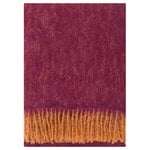
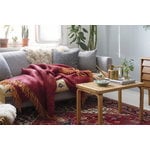
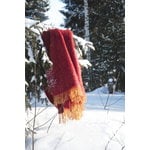
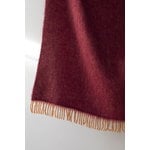
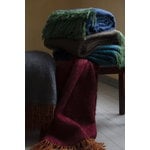
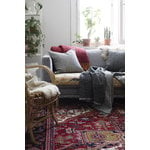
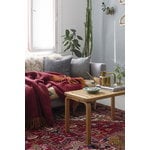
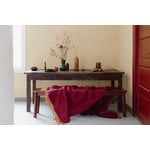
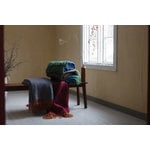
Revontuli mohair blanket, rust - bordeaux
Lapuan Kankurit
Description
The Revontuli mohair blanket by Lapuan Kankurit is coloured in beautiful, rich tones inspired by the northern lights – Revontuli is Finnish for Aurora Borealis. The luxuriously soft mohair blanket, designed by Elina Helenius, is woven in two colours and has fringes on the edges. The Revontuli blanket is made of mulesing-free South African mohair and New Zeeland wool in a Lithuanian sewing company.
Product details (6)
- Material
- 70% mohair wool, 30% pure new wool
- Colour
- Rust, bordeaux
- Length
- 170 cm
- Measurement details
- Length: 170 cm + fringes
- Width
- 130 cm
- Care instructions
- Only wash if textile is very dirty, otherwise hang outdoors in fresh air for a while. Brush the blanket every now and then gently with a fabric brush, following the grain of the wool. Hand wash at max. 30°C or dry clean.
- Product ID
Designer
Elina Helenius (b. 1963) is a Finnish textile designer specialising in surface, colour and pattern design. She graduated from the University of Art and Design Helsinki, Textile Department, in 1988. Helenius has worked extensively in product design and in the field of productization applying Finnish design know-how to the needs of domestic and foreign clients, including Aarikka, Adea, Doctor Design, Marimekko, Showroom Finland and Lapuan Kankurit. She has received prizes in several design competitions and her works are represented in the collection of the Helsinki Design Museum, Kyoto Textile Resource Center, and Röhsska Museum of Fashion, Design and Decorative Arts in Göteborg, Sweden.
View all productsReviews (1)
5
Based on 1 reviews
-
M
Michaela H
453 days ago
Sustainability
The Product Sustainability Framework, our criteria of sustainable design, helps you find the most sustainable products in our selection. Read below which sustainability criteria this product has met.
Working conditions & labour 9/9
-
Equal opportunities for all employees
-
Commitment to UN Global Compact, fair compensation for all employees
-
Corporate responsibility requirements defined and communicated for suppliers
-
Systematic work for improved inclusion and well-being in the workplace
-
Transparent supply chain
-
Suppliers' compliance to a code of conduct ensured
-
Direct suppliers audited and certified
-
Compliance to the UN Guiding Principles on Business and Human Rights ensured in the supply chain
-
Support for community involvement in the supply chain
Eco-friendly production 9/9
-
Fair and resource-wise water-use in production
-
No incineration or landfilling of returned items
-
No use of endangered species as materials
-
No direct environmental emissions or waste (excl. GHGs) from production
-
The sustainability of direct suppliers' production is addressed and monitored
-
Production and material sourcing that respect biodiversity, animal rights, and natural ecosystems
-
Material-efficient and ecological packaging
-
Positive impact on nature’s well-being through operations that regenerate natural ecosystems
-
No potentially harmful chemicals used in own production
Climate impact 5/8
-
Company's direct greenhouse gas emissions identified and commitment to reduction
-
Product's carbon impact identified and commitment to reduction
-
Guidance on energy- and eco-efficient use of the product
-
Contribution to climate initiatives beyond the brand’s direct operations
-
100 % renewable energy in own production and operations
-
Low-carbon or compensated transportation
-
Carbon footprint of the product calculated and goals set to reduce it
-
Carbon neutral or carbon negative product
Sustainable materials 5/6
-
Sustainable and long-lasting material choices
-
No harmful or hazardous substances
-
Responsible raw material sourcing and production
-
Materials suited for circularity: monomaterials, recyclable finishings, renewable or recycled contents etc.
-
Ecological materials: natural, biodegradable, recyclable or recycled contents
-
Outstanding materials in terms of innovativeness, responsibility, sustainability and circularity: local production or sourcing, 100 % recycled content, C2C-certification etc.
Circular design 5/5
-
High aesthetic quality promoting long-term use of the product
-
Technically durable product design and material choices
-
Design for enduring life-long quality
-
Design and support for product maintenance, repair and upgradability
-
Innovative circular design solutions: circular service system, resale platform, remanufacturing, collection of used products, etc.












